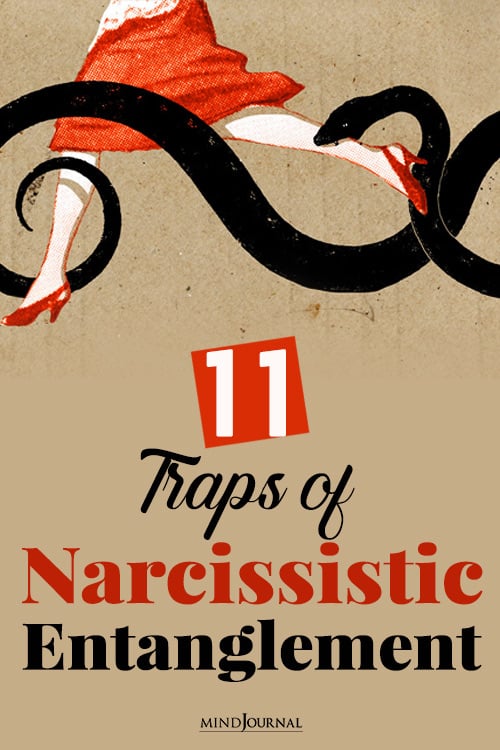Are you trapped in a web of Narcissistic entanglement? Entanglement is a typical narcissistic manipulation technique with which a narcissist keeps you under their control.
The following article talks about 11 traps of narcissistic entanglement and tips on disarming the narcissist that you should know from a narcissist himself.
Vent your spleen. Have your say. Give us both barrels. Let us know what you really think. Such sentiments towards my kind are entirely understandable and they invariably occur post-discard and sometimes post-escape.
There are differing rationales associated with this almost overwhelming need to speak to us about your experience of being entangled with our kind.

11 Traps of Narcissistic Entanglement
Here are the different ways a narcissist or a person with narcissistic traits will keep you entangled with them:
1. Anger.
You realize how you have been manipulated, abused, and taken for a fool. Your anger is substantial and you feel a pressing need to unleash that anger against us with a litany of insults and some choice language.
2. Enlightenment.
You have had your epiphany and realized precisely what ensnared you, how it happened, and why. You have seized this knowledge and now feel elated that you have done so. There is a sense of superiority in finally having all the pieces of the puzzle click into place and you want to confront us. You may not actually tell us what we are but you will certainly want to use the words, “I know what you are now.”

3. Unfinished Business Part One.
Nearly all discards occur without you being told that the Formal Relationship is over and if you are given such notice you are rarely given any proper or adequate explanation as to why this has happened. This results in the need to confront us at a later stage in order to try to find out why what has happened, has happened.
4. Unfinished Business Part Two.
This is akin to the situation above but the basis of this confrontation is in order to demand of us how we could do what we did and address your need to have us explain ourselves for what we did during the relationship.
Read The Ten Types of Victim the Narcissist Hoovers
5. To Understand.
You do not know what you were entangled with and you are unable to comprehend how somebody could behave in that manner towards you after everything that you did for us. This tirade details all of the help you gave us, the advantages that you conferred on us, and each and everything you did for us in the name of love.
6. Clear the Smear.
Predictably enough, you will have been smeared following your entanglement with us. You have heard all about the lies that have been peddled about you and you want to set us straight about how those comments were wrong, that you did not behave in the manner which we have described to other people, and ultimately how you need to clear your name.
7. The Right to Be Heard.
You have a significant desire to be heard, especially as our manipulation of you will have caused you to feel that you have not been listened to during the Formal Relationship. You want your voice to be heard, you need to articulate your thoughts and feelings and an opportunity to avail yourself of discharging this need is too good to pass up.
Read How Sharing Your Concerns Makes You Vulnerable To A Narcissist
8. Convey the Pain.
You remain horrendously wounded by your experience of being entangled with us and you want to let us know how badly we hurt you, how much it pains you still, and how upset you are to have been treated this way.
9. Sing the Praises.
Sometimes you exhibit a capacity for nobility that manages to transcend the hurt, the pain, and the anger. You remain bewitched by the golden period and all those magnificent attributes that you believe we still possess and therefore rather than attack us, expound bitterness, or lash out, you declare all the reasons why you still love us, why you find us mesmerizing despite what has happened and you wish us well for the future.
10. Justice
It is only right that you are given the right to reply to the treatment that has been meted out against you.
11. Medicine.
You put up with the tantrums, the lengthy invectives, the oral onslaughts and you were pummelled by our words. Now it is the time to give us a taste of our own medicine.
Whatever the motivation may be, your need and desire to have that final confrontation with us, to purge yourself of all those thoughts and considerations is huge and is very difficult for you to resist.
Indeed, most of the time you do not resist it at all, instead you look to engineer situations whereby you are able to speak to us and deliver this tirade, this riposte, this howitzer.
You will seek us out in order to provide us with a piece of your mind. Is this a good thing? Well, there are two potential upsides when this is looked at from your perspective.
The first is that you are able to get things off your chest.
All those thoughts that have whirled around your mind for weeks on end, the ifs and buts that prevented you from sleeping, the imponderables and the unanswered have been released as you allow your words to explode from you in an outburst of emotion applicable to whichever rationale which has driven you to this point.
Read A Mid Range Narcissist’s Manipulation Tactic: “But I can change”
The second is that you may well feel that you have achieved some kind of closure by engaging in this step of giving us a piece of your mind.
But what about our perspective on all of this? What does this blast, this sounding off and this diatribe mean to us? This is where giving a piece of your mind in such a manner is actually not a good thing for you to do. Why is this?
- Sounding off in such an emotional manner, whether it is insulting us with angry words, crying with pain, savagely mauling us with a sneering and twisted face, or even expressing how you still love us, just provides us with fuel, and it is plentiful. You may have collared us on the telephone to vent at us. Anybody normally would end the call as they are repeatedly harangued and insulted, but not us, we will listen as we soak up all that fuel. Yes, we will be argumentative, defensive, and belligerent but that is just to keep your tirade going owing to the plentiful fuel you are providing to us.
- This is a prime opportunity for us to “hoover” you. If we see you are angry, we may express false contrition, if you are hurt and upset we may declare how we will make changes so everything is right, if you reminisce about our wonderful times we will offer that golden period again to you. You are giving us a glorious opportunity to hoover you and in your heightened emotional state there is a good chance this will succeed.
- If we do not hoover at this point, you have just given us several reasons to execute a hoover at a later juncture by confirming to us that you remain adrift in the emotional state, you are fountaining with fuel and still beholden to us. The signs are good and it all points to a successful hoover in the near future.
- You confirm to us that you have failed to grasp the logic and reason of the situation and therefore your defenses are weak. This means that further manipulations can be used and they will prove effective in terms of fuel and control.
- We take no notice of what you are actually saying. You may think that your speech is devastating, that you are landing telling blows on us, that you are assassinating our character and making us look terrible. You are not. You are playing into our hands. We are laughing at you inside.
- You are confirming that we continue to have considerable control over you. We may be busy with a new primary source but this confirmation acts as a green light to further unleashing of manipulations against you because you are not able to let go.
The temptation to give us a piece of your mind is vast and overwhelming but if done in the usual emotional fashion of the typical empathic individual you are just giving us more of what we want, failing to hurt us and extending your own entanglement with us.
Read I Cannot Do This Anymore: The Narcissist’s Trap For You
Written By: HG Tudor
Originally Appeared On: Narcsite.com
Republished with permission.
Narcissists always have one way or the other to get you sucked into their world. One example of narcissistic behavior is their ability to engage you showing their false reality and entangling you completely.
If you are an empath or struggle with boundaries, your vulnerabilities can be abused by them to maintain their grip over you, just for the sake of the attention or “Narcissistic supply” you offer them as fuel.
It is important to know about the narcissistic tactics of control and manipulation so that you can identify narcissistic behavior and set yourself free from an abusive or dysfunctional connection.
If you feel you are or at any point in time have been a victim of someone with a narcissistic personality disorder or narcissistic tendencies, we hope you find insights or some closure that will help you get out of the narcissistic entanglement trap.













Leave a Reply